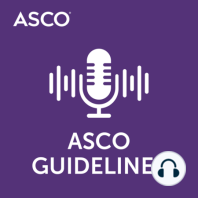11 min listen

Management of Cancer-associated Anemia with Erythropoiesis-Stimulating Agents Guideline
FromASCO Guidelines
Management of Cancer-associated Anemia with Erythropoiesis-Stimulating Agents Guideline
FromASCO Guidelines
ratings:
Length:
10 minutes
Released:
Apr 10, 2019
Format:
Podcast episode
Description
An interview with Dr. Alejandro Lazo-Langner on Management of Cancer-associated Anemia with Erythropoiesis-Stimulating Agents: ASCO/ASH Clinical Practice Guideline Update which provides recommendations on ESAs (and biosimilars) for patients with chemotherapy-associated anemia in the noncurative setting. The purpose of this podcast is to educate and to inform. This is not a substitute for professional medical care and is not intended for use in the diagnosis or treatment of individual conditions. Guests on this podcast express their own opinions, experience, and conclusions. The mention of any product, service, organization, activity, or therapy should not be construed as an ASCO endorsement. Hello and welcome to the ASCO Guidelines Podcast Series. My name is Shannon McKernin, and today I'm interviewing Dr. Alejandro Lazo-Langner from Western University in London, Ontario, senior author on Management of Cancer-Associated Anemia with Erythropoeiesis-stimulating Agents, ASCO/ASH Clinical Practice Guidelines Update. Thank you for being here today, Dr. Lazo-Langner. Thank you very much for the invitation to present the new guidelines. So this guideline has been updated now three times since its original publication in 2002. So how has this guideline changed over time? Since initial publication in 2002, this guideline has undergone a number of different changes. If you look at the initial series of recommendations in the 2002 guideline, it was really limited and it was fairly upfront recommending the use of erythropoiesis-stimulating agents in this setting. But during the last two updates in 2007 and 2010, that has changed significantly. And in the current guidelines, we have added some additional evidence that has been published in the last eight years. And now, in general, what we can tell is that the use of erythropoiesis-stimulating agents is now more restrictive than in the original guideline and is basically recommended for only one or two situations. There has been some other updates in the last iteration of the guideline that I can certainly discuss in more detail later. But basically, in general, the guideline has now, in the last iterations, restricted the recommendations that were much more general during the first edition of this guideline, almost all of them based on available and emerging evidence regarding the onset of their side effects with these medications. And can you give us a general overview of what this new guideline update covers, especially that new evidence that's emerged? Yeah. So the new guideline has changed a few items. And indeed, we-- the committee did a little bit of an overhaul in the recommendations that are not in the same order as they were in the previous editions. We can say that there is a couple of important updates. The first one would be addressing the use of biosimilars, which were not available in the previous guidelines. And we have addressed that in the current edition. The biosimilars have not been extensively studied in cancer, but they have. And so far, the committee considered that they were equivalent in terms of effectiveness and safety to the originator agents, both epoetin and erythropoietin. And the second most important update on the guideline is the recommendation of the concurrent use of iron supplementation in patients who are receiving erythropoietin-stimulating agents. The previous versions of the guideline just recommended the use of iron supplementation in patients with documented iron deficiency. However, in the last eight years, there's been a number of studies that have suggested that the concurrent use of iron supplementation, irrespective of the baseline iron status, does increase the efficacy of the agents. Third point is that, although this is not new, there's been more emerging evidence supporting the notion that all of the erythropoietin-stimluating agents increase the risk of thromboembolism. And this has been very consistent across all studies, and in pa
Released:
Apr 10, 2019
Format:
Podcast episode
Titles in the series (100)
Early Detection for Colorectal Cancer Resource-Stratified Guideline: An interview with Dr. Marcia Cruz-Correa from the University of Puerto Rico and MD Anderson Cancer Center on the ASCO Resource Stratified Guideline on early detection for colorectal cancer. The purpose of this podcast is to educate and to inform. This... by ASCO Guidelines